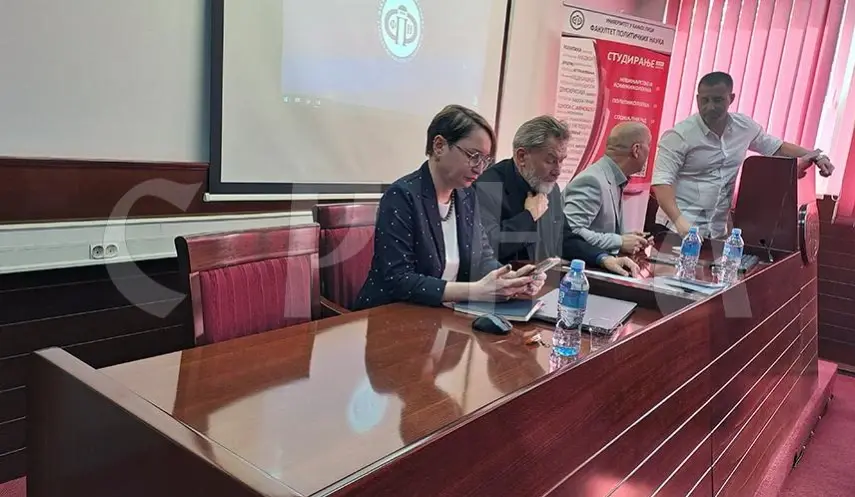PROMINENT RUSSIAN SCIENTISTS REDISCOVERING SERBDOM IN BANJA LUKA
Republika Srpska - Banja Luka - Faculty of Political Science /FPS/
10/17/2025
15:39

BANJA LUKA, OCTOBER 17 /SRNA/ – One of today's most prominent Russian philosophers and cultural theorists, Pavel Olkhov, from the University of Belgorod, says that the rediscovery of Serbdom was one of the key reasons for his visit to Republika Srpska and gave a lecture at the Faculty of Political Science /FPS/ of the University of Banja Luka.
Olkhov and Aleksandra Yakovleva, a leading researcher from the Institute of World Economy and International Relations in Moscow, delivered lectures on cultural diplomacy and the culture of remembrance in the digital age.
"On our way to Serbia, we already knew about the richness and vibrancy of Serbian culture, but we were told - If you want to find the essence of Serbdom, go to Republika Srpska," Olkhov told the press.
He explained there are no universal formulas when it comes to cultural diplomacy, but there are good foundations for developing them.
In his lecture, Olkhov discussed two great Russian cultural figures: Nikolay Karamzin and Nikolay Stankevich, the latter being a highly respected Russian thinker of Serbian origin.
He also touched on the expulsion of Russian writers from libraries and the removal of people from theaters amid the widespread Russophobia in the West, noting he would not respond harshly to such topics, but quoted a Russian poet who said that "some civilizations experience their sunsets".
He added that he sees hope for a sunrise through Russian–Serbian relations, too.
Yakovleva spoke about the culture of remembrance and its importance in political life, as well as how the culture of remembrance can be shaped in the era of digitalization.
She outlined the key topics of her lecture: why the culture of remembrance is crucial in the political life of a country, in international relations, and how it manifests in today's post-truth world.
The lectures were organised as part of the international cooperation between Banja Luka’s Faculty of Political Science and esteemed scientists and researchers from the Russian Federation.
The faculty's Vice Dean for Scientific Research and International Cooperation Vlade Simović said that these two eminent Russian scientists chose topics for their lectures that the local public and students had not previously had the opportunity to hear, making their visit a special event for the faculty.
"These lectures are building bridges between the Serb and Russian worlds, connecting Republika Srpska and the Russian Federation in the best possible way, through science, culture, and education. I believe this is something from which we can all draw value, as the knowledge they are sharing with us is truly precious," Simović stated.

SERBS IN TEARS AND FEAR OVER OWNERSHIP OF ORTHODOX CEMETERIES AND CHURCHES

CVIJANOVIĆ DEMANDS ACCOUNTABILITY FOR SHAMEFUL CONCERT IN ŠIROKI BRIJEG

OSTOJIĆ URGES BiH AND EU TO ACT OVER GLORIFICATION OF FASCIST IDEOLOGIES





